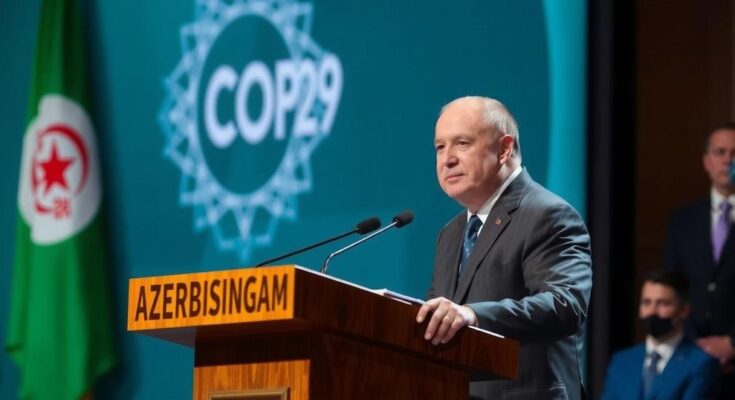During the COP29 climate talks in Baku, President Ilham Aliyev’s confrontational rhetoric against Western countries and strong support for fossil fuels raised questions about Azerbaijan’s sincerity in pursuing climate goals. His critiques sparked backlash from European diplomats, revealing heightened tensions and concerns over Azerbaijan’s role as host of the climate summit amid ongoing human rights issues.
Azerbaijan’s President Ilham Aliyev has stirred significant controversy during the COP29 climate talks held in Baku, overshadowing critical discussions on climate action with his confrontational rhetoric and strong fossil fuel advocacy. Launching the conference with scathing comments against Western nations, Aliyev intensified his criticisms by labeling countries such as France and the Netherlands as neocolonial powers. He accused these nations of silencing the voices of their overseas territories, which he claimed were being “brutally” suppressed.
His harsh rhetoric extended to European institutions, where he branded the European Parliament and the Council of Europe as “symbols of political corruption.” These remarks provoked immediate backlash from European officials, including French Ecological Transition Minister Agnès Pannier-Runacher, who deemed his comments “unacceptable” and beneath the dignity of the COP presidency. As tensions escalated, France’s Foreign Ministry summoned Azerbaijan’s ambassador to protest the remarks, prompting a reciprocal diplomatic response.
Aliyev’s comments were flanked by allegations directed at France and the Netherlands concerning neocolonial dynamics, which drew sharp criticism. Wopke Hoekstra, the EU’s Climate Commissioner, supported France, declaring that such accusations were inappropriate and detrimental to climate progress. EU Foreign Affairs chief Josep Borrell characterized Aliyev’s statements as “regrettable” and warned that they could undermine Azerbaijan’s credibility as host of COP29.
In addition to political friction, President Aliyev promoted Azerbaijan’s fossil fuel agenda during COP29, asserting that fossil fuels are a “gift from God,” which further complicated perceptions of his commitment to climate issues. His statements also contradict efforts to address significant human rights concerns in Azerbaijan, as the country has faced scrutiny over its treatment of political prisoners, including journalists and activists.
Aliyev’s approach represents a broader strategy wherein Azerbaijan seeks to leverage COP29 to bolster its political interests while casting doubt on its genuine engagement with global climate initiatives. This stance has raised alarms regarding who benefits from the climate forum and the potential implications for authentic climate policy advancement in the region.
The COP29 climate talks in Baku have been marked by President Aliyev’s polarizing rhetoric and advocacy for fossil fuels, raising critical questions about Azerbaijan’s commitment to environmental sustainability. While hosting the global conference, Aliyev’s speeches drew sharp scrutiny from European diplomats, especially following escalating tensions between Azerbaijan and France due to geopolitical issues, particularly following Azerbaijan’s takeover of Nagorno-Karabakh. This backdrop of deterioration in international relations, combined with Azerbaijan’s reliance on fossil fuel exports and its efforts to present itself as a leader in decolonization, complicates its role in climate discussions.
In summary, President Aliyev’s conduct at COP29 has generated considerable controversy, illustrating a deepening divide between Azerbaijan and European nations over matters of climate responsibility and political rhetoric. His emphasis on fossil fuel advocacy and confrontational comments appear to serve Azerbaijan’s political interests rather than contribute to meaningful climate action. This scenario raises questions about the future effectiveness of international climate negotiations and the sincerity of commitments made by fossil fuel-dependent nations in addressing climate change.
Original Source: www.euractiv.com




